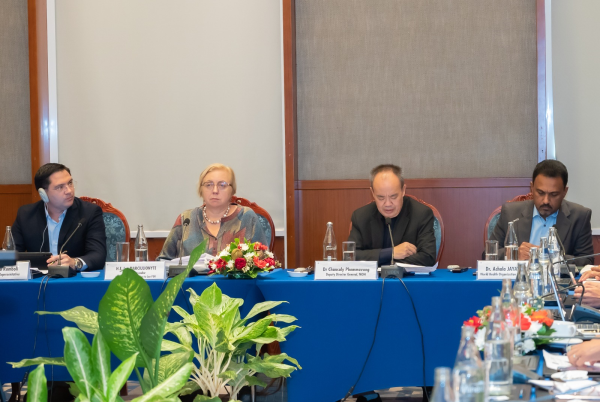KPL
(KPL) The government of the Lao PDR hosted a global meeting attended by nutrition experts and leaders from across five countries, UNICEF and the World Health Organization (WHO) Headquarter, regional and country office staff as well as representatives from GIZ, to discuss the role of data in improving the nutritional well-being of children and women.

(KPL) The government of the Lao PDR hosted a global meeting attended by nutrition experts and leaders from across five countries, UNICEF and the World Health Organization (WHO) Headquarter, regional and country office staff as well as representatives from GIZ, to discuss the role of data in improving the nutritional well-being of children and women.
The meeting was organised by the Ministry of Health as part of the global European Union-UNICEF-WHO initiative Strengthening National Nutrition Information Systems (SNNIS), which aims at improving national capacities to generate quality nutrition data to support better policies and programmes in Luang Prabang last month.
The initiative commenced in 2020 in partnership with national Governments across the five countries of Ethiopia, Cote D’Ivoire, Lao PDR, Uganda and Zambia with technical support by UNICEF and WHO, and with financial support from the European Commission.
“Today’s meeting is an important opportunity for leading nutrition experts across five countries to discuss the progress, challenges and the way forward on how we can generate more accurate routine nutrition data to improve service, planning and implementation of interventions,” explained Dr. Chansaly Phommavong, Deputy Director General of the Department of Planning and Finance, Ministry of Health. “The Ministry of Health expresses our thanks to UNICEF and WHO for their support in implementing the project in the Lao PDR and to the EU for their continued financial support for this most important agenda.”

“Nutrition remains a key priority for the EU and the SNNIS initiative is part of the EU’s support to the Government of Lao PDR to address all forms of malnutrition. The availability and use of high quality and timely routine data is key to making sound decisions to optimize the use of available resources to achieve maximum results.” remarked Ms. Ina Marčiulionytė, the EU Ambassador to the Lao PDR.
The visiting delegation to the meeting, which also comprises of members from UNICEF and WHO Headquarters and Regional offices, also had the chance to visit health facilities in Luang Prabang to observe how investments under the SNNIS project has contributed to improved routine data on nutrition, and to better understand how this can contribute to improved service delivery.
“With the COVID-19 pandemic and the following global economic crisis, countries are facing additional challenges, potentially undermining the great progress of the past decades in reducing the high levels of malnutrition” stated Mr. Arturo Romboli, Deputy Representative, UNICEF Lao PDR. “Now more than ever do we need to prioritize our efforts to ensure that the resources are utilized most effectively to achieve the best results for children. To do this, data is key and this global initiative is more important than ever before.”
“Strengthening the availability of routine nutrition data is essential for improved nutrition. As a decades-long supporter of health information systems, nutrition, and maternal health in Lao PDR, improving links between the two, and the better use of information, is vital and directly linked to better health outcomes for children, mothers, and families. The SNNIS project in Lao PDR is led by the Ministry of Health and leverages the country’s pre-existing health information management system based on DHIS2 – a system jointly established by the Ministry of Health and WHO in 2013, and now expanded nationwide as the core, centralized health information system” said Dr. Achala Upendra Jayatilleke, Technical Officer (Health Information Systems) on behalf of the WHO Representative for the Lao PDR. “WHO, alongside our sister agency UNICEF, reaffirm our joint support to the Ministry of Health in improving data availability for use in decision-making around nutrition.”
KPL